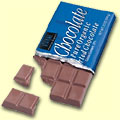|
|
|
Wonderful News: Chocolate's Good For You!
February's health tip: eat more chocolate. That's right. Eat more chocolate. I know it sounds crazy, but recent studies have indicated multiple health benefits from consuming chocolate in moderate quantities. Got that? Especially the "moderate quantities" part? My "eat more" advice only applies if you're not ingesting mass quantities to begin with. If dinner for you is an entire can of Betty Crocker Chocolate Cake Frosting, please stop reading now. You don't need any more encouragement. I realize that "chocolate is good" probably isn't new news for you. The media has been all over this story since the fall. However, there was a lot of misinformation in the reports, which I'd like to set straight. First of all, not all chocolate is created equal. From a health standpoint, you want dark chocolate. It has the greatest concentration of antioxidants: phenols and flavonoids. Milk chocolate has them in lesser amounts, while white chocolate has none (it's just a mix of fat, milk, and sugar). Those potent antioxidants may offer protection against heart disease and possibly cancer. Some reports – although funded by chocolate manufacturers, so take with an appropriate grain – indicate chocolate contains far more antioxidant factors than most fruit, red wine, or green tea. A French study showed consumption of cocoa bean products providing similar benefits to a long lasting dose of vitamin E. Indeed, a cup of hot cocoa (real hot cocoa, not that artificially-flavored, packaged crap) has twice the antioxidants of red wine and three times what is found in green tea. If you want the health benefits of chocolate without too many calories or fat grams, consider drinking cocoa instead. A regular ounce-and-a-half ounce chocolate bar contains about eight grams of saturated fat, while a one-cup serving of hot cocoa has less than half a gram. Remember though, there's a big difference between hot chocolate and hot cocoa. People use the terms interchangeably but they're two different beverages. Cocoa is a fine powder, made either from pure cocoa beans or ones that have been treated with an alkali to reduce bitterness (called Dutch-processed). Real hot chocolate is made by melting bittersweet or semi-sweet chocolate pieces in milk or cream. Some people consider the very best to be Mexican hot chocolate, which is made into thin disks containing dark chocolate, almonds, cinnamon, and sugar. Apparently this is an ancient Aztec recipe, and the Mayans considered it an aphrodisiac. But I digress… Paradoxically, cocoa butter, which is a saturated fat, has been shown to have a beneficial effect on cholesterol levels (lowering the bad LDL and raising the good HDL components). Moreover, dark chocolate contains a number of psychoactive compounds that can improve mood by boosting serotonin and endorphin levels in your brain. As you know, real chocolate contains a good amount of caffeine. It also contains a stimulant called theobromine. Unless they're particularly sensitive, most people enjoy a little chocolate lift in the afternoon. So enjoy your chocolate (in moderation, please). Just remember, many expensive, heavily processed chocolates contain little or no flavonoids. The less expensive dark chocolates, which list "cocoa mass" as a primary ingredient, deliver the real nutritional goodies, along with an attitude-adjustment mood lift, in a nice tasty package. |

